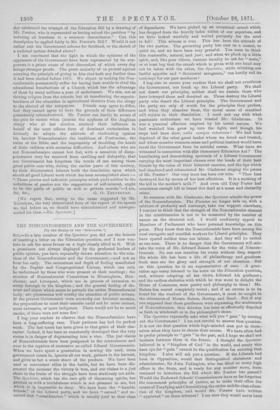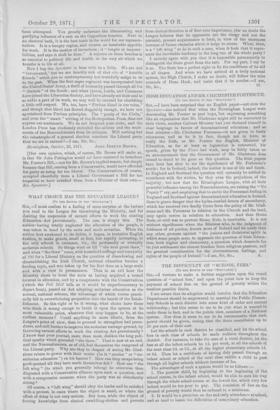THE NONCONFORMISTS AND THE GOVERNMENT.
[TQ TEM EDL,TW1 OF THE 41 SPECTATOR, 6114—In a late number of the Spectator you did me the honour of inserting a letter on the Education question, and I now ven- ture to ask the same favour on a topic closely allied to it. With a prescience not always displayed by the professed leaders of public opinion, you have repeatedly drawn attention to the rela- tions of the Nonconformists and the Government,—and not an hour too early. The earnestness and depth of feeling manifested by the Baptist and Congregational Unions, which can only be understood by those who were present at their meetings ; the creation of Nonconformist Committees in Birmingham, Man- chester, and Liverpool, which are in process of extension to every borough in the kingdom ; and the general feeling of dis- trust and alarm which seems to pervade the entire Nonconformist body, are phenomena well worthy the attention of public writers. If the present Government were avowedly our bitterest enemies, the preparations to meet their assaults could not be more earnest, more extensive, or more indignant. There would not be so much smoke, if there were not some fire!
I beg your readers to observe that the Nonconformists have been a long-suffering race. Their patience has had its perfect work. The last touch has been given to that grace of their cha- racter. Indeed, it has been so unnaturally developed that the very virtue is in danger of degenerating into a vice. The just claims of Nonconformists have been postponed to the convenience and even to the caprices of successive so-called Liberal Governments. When we have spent a generation in sowing the seed, some government comes in, ignores all our work, gathers in the harvest, and gives us but a scant share of the produce. We have been need as convenient allies in the battle, but we have been dis- avowed the moment the victory is won, and our claims to a just ehare in the fruits of the struggle have been studiously set aside. The Spectator, which has the rare gift of discerning spirits, has punted us with a truthfulness which is not pleasant to see, but which it is impossible to deny. We have been the " humble friends" of the Liberal party, and we have " earned " and re- cowed that " consideration " which is usually paid to that class of dependants. We have picked up an occasional crumb which has dropped from the heavily laden tables of our superiors, and we have looked wistfully and waited patiently for the next to fall! This witness is true. This has been the attitude of the two parties. The governing party has cast us a morsel, to quiet us, and we have been very grateful. You seem to think this reasonable, natural, and just; and when we pluck up a little spirit, and, like poor Oliver, venture humbly to ask for "more," or at least beg that the crumb which is given with one hand may not be taken with the other, the Spectator, while rebuking our lustful appetite and 46 dictatorial arrogance," can hardly veil its contempt for our past meekness ! I beg also to assure your readers that we shall not overthrow the Government, nor break up the Liberal party. We shall not desert our principles, neither shall we sustain those who have betrayed them and deceived us. Those destroy the Liberal party who desert the Liberal principles. The Government and the party are only of worth for the principles they profess, and when they abandon these, the moral sense of mankind will rejoice in their dissolution. I need not say with what passionate enthusiasm we have trusted Mr. Gladstone. It was a personal affection inspired by his moral nature. We had watched him grow up into the light, and though his steps had been slow, nulla vestigia retrorsu011 We had been deprived of the other great leader whom we loved and trusted, and whose massive common-sense and political instinct would have saved the Government from its suicidal course. What have we witnessed in connection with this elementary Education Act ? The humiliating and demoralizing spectacle of a Liberal Government carrying the most important clauses over the heads of their best friends by the votes of their bitterest enemies, and the lips which had slandered and calumniated Mr. Gladstone singing the paeans of Mr. Forster I Our very trust has been our ruin. " Thou haat destroyed her by means of her best affections. It is a seething of the kid in the mother's milk l" And even old Tony Foster bad conscience enough left to brand that deed as a mean and dastardly crime.
In common with Mr. Gladstone, the Spectator admits the power of the Nonconformists. The Premier no longer bids us, with a mixture of profanity and contempt, take our support elsewhere. I venture to think that the strength of the Nonconformist element in the constituencies is not to be measured by the number of names on the electoral roll. I would confidently appeal to Members of Parliament who have personal knowledge on this point. They know that the Nonconformists have been among the most energetic and unselfish workers for Liberal principles. They have spared neither time nor labour. And they will be united as one man. There is no danger that the Government will mis- take the voice of Mr. Edward Baines for the voice of Noncon- formists. No one can mention his name without deep respect His whole life has been a life of philanthropy and goodness Such men are the glory and strength of our churches. But on this question he is no representative of ours. A gene- ration ago many listened to his voice on the Education question, and, without adopting all his views, followed his guidance ; and the endless statistics with which he was wont to delight the House of Commons, were poetry and philosophy to them Mr. Baines has veered completely round ; and if an excuse is to be found for the conduct of the Government, it must be sought in the utterances of Messrs. Baines, Morley, and Reed. But if any one supposed that those gentlemen were expressing the sentiments of Nonconformists, that delusion has been as effectually dispelled as faith in witchcraft or in the philosopher's atone.
The Spectator repeatedly asks what will you " gain" by turning out the Government ? I am not careful to answer that question. It is not the first question which high-minded men put to them- selves when they have to choose their course. We have often had to prefer principle to " gain " in the past, and I hope we shall not hesitate between them in the future. I thought the Spectator believed in a "kingdom of God " in the world, and surely this keen eye for "gain " cannot be the qualification for entering that kingdom. I also will ask you a question. If the Liberals had been in Opposition, would that distinguished statesman and administrator, Sir John Pakington, who has filled so many high offices in the State, and is ready for any number more, have ventured to introduce the Bill which Mr. Forster has passed? Would the Endowed Schools' Commissioners have so far forgotten the commonest principles of justice, as to make their office the means of Toryfying and Churchifying the entire middle-class educa- tion of the kingdom, and would Mr. Forster have written approved" on these schemes ? I am sure they would never have
been attempted. You greatly underrate the illuminating and purifying influence of a seat on the Opposition benches. Next to an electoral bath, it is the best tonic in the world for our represen- tatives. It is a hungry region, and creates an insatiable appetite for work. It is the mother of inventions ; it " laughs at impossi- bilities, and says it shall be done." A sojourn on these benches is as essential to political life and health as the very air which we breathe is to life at all.
Now I beg the Spectator to bear with us a little. We are not a' intoxicated," but we are heartily sick of that role of " humble 'friends " which you so contemptuously but truthfully assign to us in the past. When the first negro regiment was incorporated into 'the United States' Army, a thrill of humanity passed through all the 46 chattels " of the South ; and when Queen, Lords, and Commons have joined the Liberation Society, and have already set their seal to 10 noble a part of its work, we may well be excused for cherishing
little self-respect. We, too, have "Puritan blood in our veins," and though that blood has flowed sluggishly enough, we have not apostatized from Puritan principles. The "gossip of the Clubs," -and even the " smart " writing of the Metropolitan Press, does not -express our sentiments. We do not frequent your clubs, and the London Press has studiously excluded the actions and the senti- anents of the Nonconformists from its columns. Will nothing but the catastrophe of a general election convince the Liberal party that we are in earnest ?—I am, Sir, Ste.,
Birmingham, October, 23, 1871. JOHN JENICYN BROWN.
[Our own opinion, which, of course, Mr. Brown will smile at, is that Sir John Pakington would not have ventured to introduce Mr. Forster's Bill,—not for Mr. Brown's implied reason, but simply 'because that Bill, coming from a Conservative, would have offended his party as being far too liberal, The Conservatives, of course, accepted cheerfully from a Liberal Government a Bill far too impartial to have satisfied them from a Minister of their own.— ED. Spectator.]



































 Previous page
Previous page